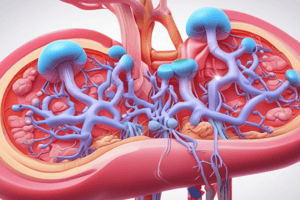Podcast
Questions and Answers
What is the primary function of the urinary system?
What is the primary function of the urinary system?
- Filtering and excreting waste products (correct)
- Producing hormones
- Regulating blood pressure
- Maintaining body temperature
Which structure in the nephron is responsible for the filtration of blood?
Which structure in the nephron is responsible for the filtration of blood?
- Glomerulus (correct)
- Loop of Henle
- Collecting duct
- Proximal convoluted tubule
How does the nephron contribute to maintaining homeostasis of water balance?
How does the nephron contribute to maintaining homeostasis of water balance?
- By producing excess hormones
- By filtering out all blood components
- By increasing urine production during dehydration
- By reabsorbing water and electrolytes as needed (correct)
What is the correct pathway of blood flow through the nephron?
What is the correct pathway of blood flow through the nephron?
Which of the following best describes the term 'homeostasis' in relation to the urinary system?
Which of the following best describes the term 'homeostasis' in relation to the urinary system?
What is the primary location for filtration in the nephron?
What is the primary location for filtration in the nephron?
Which process involves the movement of substances from the blood back into the nephron?
Which process involves the movement of substances from the blood back into the nephron?
What hormone is responsible for increasing the reabsorption of sodium?
What hormone is responsible for increasing the reabsorption of sodium?
What happens if all carrier sites for reabsorption are full?
What happens if all carrier sites for reabsorption are full?
Which of the following functions is NOT performed by the kidney?
Which of the following functions is NOT performed by the kidney?
In which section of the nephron does the selective reabsorption mostly occur?
In which section of the nephron does the selective reabsorption mostly occur?
Which component typically does NOT pass through the semipermeable walls during filtration?
Which component typically does NOT pass through the semipermeable walls during filtration?
What is the main function of the renal threshold in the reabsorption process?
What is the main function of the renal threshold in the reabsorption process?
What role does angiotensin II play in the body?
What role does angiotensin II play in the body?
What substances are actively secreted into the convoluted tubules during tubular secretion?
What substances are actively secreted into the convoluted tubules during tubular secretion?
How does the body primarily lose water?
How does the body primarily lose water?
Which hormone is responsible for regulating sodium excretion?
Which hormone is responsible for regulating sodium excretion?
What effect does parathyroid hormone (PTH) have on calcium balance?
What effect does parathyroid hormone (PTH) have on calcium balance?
Which of the following accurately describes water regulation?
Which of the following accurately describes water regulation?
What is the primary process by which substances are filtered from the blood in the kidneys?
What is the primary process by which substances are filtered from the blood in the kidneys?
What is a function of calcitonin regarding calcium levels in the body?
What is a function of calcitonin regarding calcium levels in the body?
Flashcards are hidden until you start studying
Study Notes
Angiotensin II
- Vasoconstricting hormone
Tubular Secretion
- Some substances remain in the blood after filtration due to speed of filtration
- These include: hydrogen ions, drugs like penicillin and aspirin
- These substances are actively secreted into the convoluted tubules
- Energy is required for this process
Glomerular Filtrates
- Water, glucose, amino acids, urea and salts are present in the glomerular filtrates
Composition Of Urine
- Urea, creatinine, uric acid, water and salts
Water Balance
- The body gains water from food and drink
- The body loses water through urine, faeces, sweat, and expired air
Water Regulation By Antidiuretic Hormone
- Antidiuretic hormone (ADH) increases water reabsorption by increasing the permeability of the convoluted tubules
Electrolyte Balance
- Sodium and Potassium are ingested in food
- Excess is excreted in urine
- Aldosterone regulates sodium excretion
- Calcium balance - regulated by parathyroid hormone (PTH) and calcitonin
- PTH acts on kidney tubules to reabsorb calcium
- Calcitonin acts on kidney tubules to absorb less calcium
Renal Function
- Maintains normal body fluid volume and composition
- Essential for the excretion of waste products and drugs
Functions Of The Kidney
- Excretory
- Regulatory
- Endocrine
- Metabolic
Formation Of Urine
- Filtration
- Selective reabsorption
- Tubular secretion
Glomerular Capsule
- Where filtration takes place
Filtration
- Water and small molecules pass through the semipermeable walls of the glomerulus and glomerular capsule
- Larger molecules, blood cells, and plasma proteins remain in the capillaries
Selective Reabsorption
- Takes place in the tubules
- Constituents needed by the body are reabsorbed back into the blood capillary
- Active transport occurs at carrier sites in the epithelial membrane
- Energy is required to transport substances against their concentration gradients
- Renal threshold – if all carrier sites are full, substances will appear in urine
Reabsorption Regulated By Hormones
- Parathormone and calcitonin regulate calcium and phosphate reabsorption
- Antidiuretic hormone increases water reabsorption
- Aldosterone increases sodium reabsorption and potassium excretion
Studying That Suits You
Use AI to generate personalized quizzes and flashcards to suit your learning preferences.



